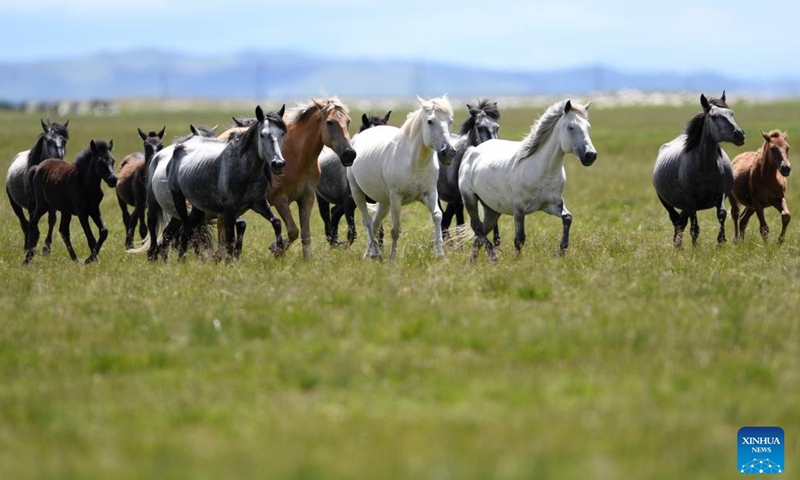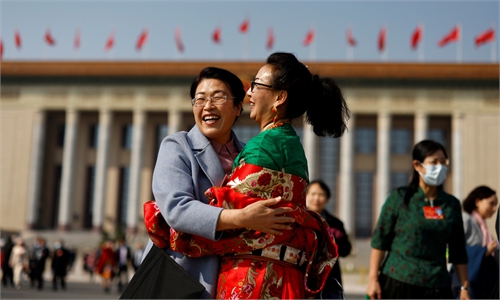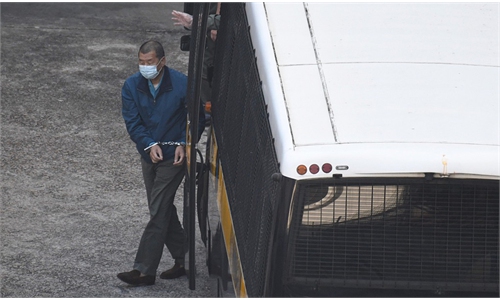Democratic, scientific process of legislation highlighted in upcoming meeting of China's top legislature

A herd of Hequ horses gallop on a ranch in Maqu County, Gannan Tibetan Autonomous Prefecture of northwest China's Gansu Province, July 15, 2021. This year's World Soil Day fell on Monday. Located on the northeast brink of the Qinghai-Tibet Plateau, Maqu County boasts an extensive presence of grasslands and wetlands, which had suffered a lot from degeneration and desertification before the end of the 20th century. (Photo: Xinhua)
A much-anticipated draft law on ecological conservation on the Qinghai-Xizang (Tibet) Plateau, draft revision to the Wildlife Protection Law and a draft revision to the Counter-Espionage Law, and three other drafts, are scheduled to be deliberated at the upcoming meeting of China's national legislature on Tuesday.
Chinese experts said the process of the draft amendments highlights the guideline of democratic and scientific legislation.
The Standing Committee of the 13th National People's Congress (NPC), or China's top legislature, will convene its 38th session from Tuesday to Friday in Beijing, according to the Xinhua News Agency.
Among the six drafts that are scheduled to be considered during the upcoming meeting, the draft law on ecological conservation on the Qinghai-Xizang Plateau will be submitted for a second instance.
In recent years, tourists on the Qinghai-Xizang Plateau left behind a lot of garbage, which has aroused public concern.
In light of the comments of all parties, the major amendments made to the second draft make it clear that tourists will not be allowed to scatter household garbage at will; otherwise they shall take the corresponding legal liability.
Those who plan to organize or participate in tourism activities on the Qinghai-Xizang Plateau shall take away the garbage generated by tourism or dispose of it at designated places, according to the draft.
Provisions were added to the draft stipulating that related parties should strictly formulate zoning control plans for the ecological environment and the list of ecological environment access in accordance with the requirements of the red line for ecological protection, the bottom line for environmental quality, and the top line for resource utilization.
The draft also stipulates strengthening the prevention and control of ecological risks on the Qinghai-Xizang Plateau, and establishing a sound ecological risk prevention and control system on the plateau.
Separately, the third reading of the draft revision to the Wildlife Protection Law submitted to the 13th NPC Standing Committee for deliberation adopted a number of specific suggestions from the public. During the public consultation period, 12,057 comments were received from 3,806 members of the public and 11 letters were received for the draft revision.
The draft improved measures to prevent and control exotic species, making it clear that wild animal species introduced from overseas may not be illegally released or discarded.
The law stipulates that the introduction of wild animal species from abroad shall be subject to the approval of the wildlife protection department under the State Council, and safe and reliable preventive measures shall be taken to prevent them from entering the wild environment and causing harm to the ecosystem.
According to the draft, the public interest litigation system has been added, providing that actions that destroy wildlife resources and the ecological environment and harm social and public interests may be filed in people's courts in accordance with relevant laws.
Also, another anticipated draft to the Counter-Espionage Law, which will be submitted for a second reading, further accurately defines "espionage acts" and punishes all kinds of espionage activities carried out by espionage organizations and their agents according to the law.
In response to espionage and other acts endangering China's national security, the draft improves law enforcement measures, standardizes law enforcement procedures and details law enforcement requirements.
Referring to the national security case of Jimmy Lai, Chief Executive Lee Ka-chiu of the Hong Kong Special Administrative Region said on Saturday that the central government would make a decision on the interpretation of the national security law for Hong Kong soon. Maria Tam Wai-chu, deputy director of Hong Kong's Basic Law Committee, who came to Beijing for the upcoming NPC Standing Committee meeting, said on Sunday that if the interpretation agenda is added, the draft will be received as soon as Monday, HK01 reported on Sunday.
Touching on the draft amendment to China's Legislation Law, Zang Tiewei, spokesperson for the Legislative Affairs Commission of the Standing Committee of the NPC, said on Monday that they received a total of 978 suggestions and two letters during the public consultation period after it published the first draft amendment following its deliberation in October.
The public's opinions and suggestions are focused on improving the guidance of legislation, promoting the openness of legislation, and improving the system and mechanism of scientific, democratic and law-based legislation, Zang said, adding that their relevant opinions and suggestions will be reflected in the second review of the draft.
These drafts responded to hot issues that have attracted attention in recent years and addressed public concerns, and the draft amendment process has implemented the guideline of scientific, democratic and law-based legislation, which will further consolidate and reflect the whole-process democracy and the socialist rule of law, Zhi Zhenfeng, a researcher at the Institute of Law of the Chinese Academy of Social Sciences, told the Global Times on Monday.
Through various channels including online opinion collection, public opinions from across the country have been effectively absorbed and adopted during the legislation process, which makes legislation more democratic and scientific, the expert noted.



